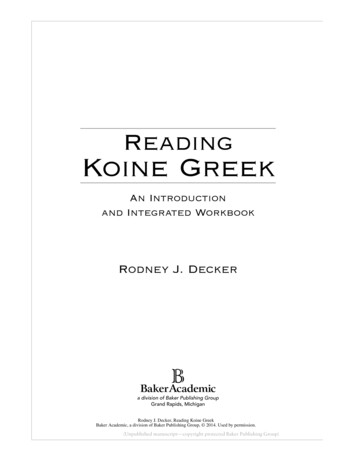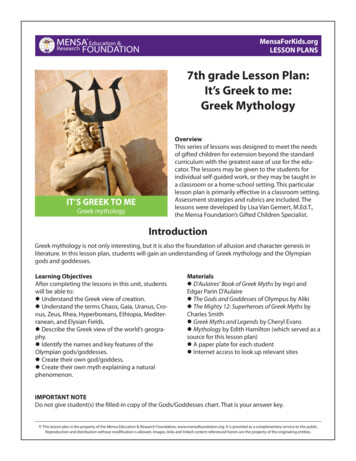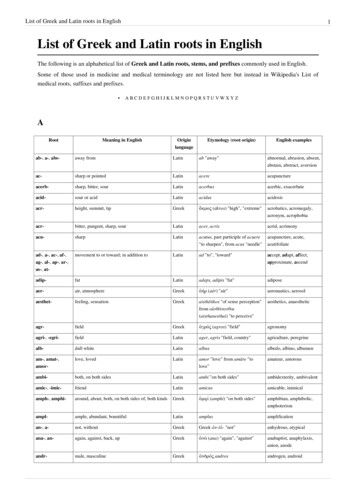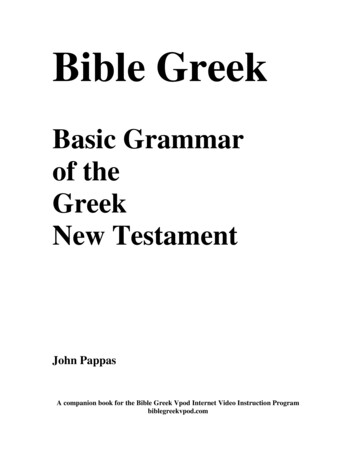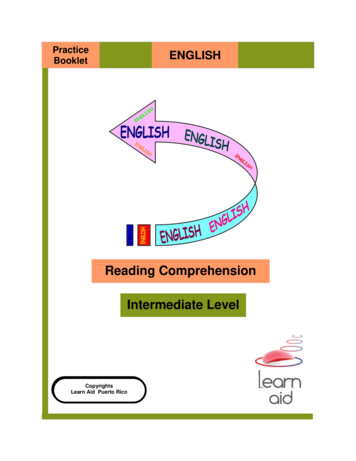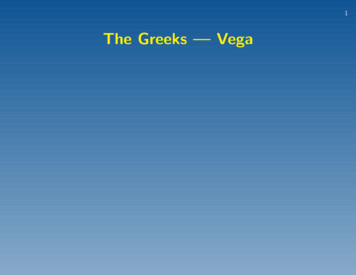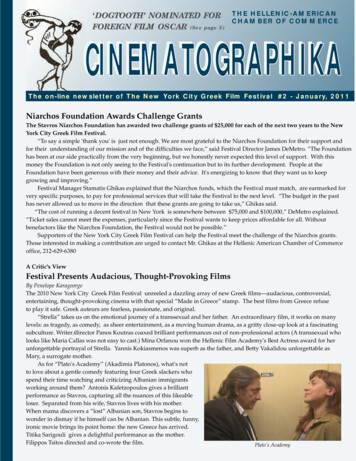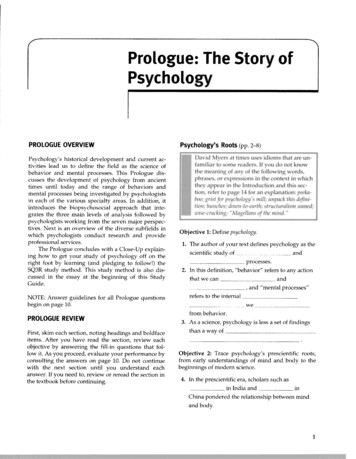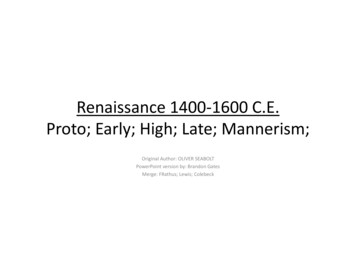
Transcription
UC-NRLFB2fi b377
AQUILA'SGREEK VERSIONOF THEHEBEEW BIBLEBY THEEev. m.Babbiof theabeahams,b.aLeeds Old Hebrew Congregationprfntet) bgSPOTTISWOODE, BALLANTYNE &1CO. LTD.New-strbet Square, London, E.G. 41919
'X%'b'\i% LOAN STACK
8S7AQDILA'S VEBSIONAND THELATER GEEEK TRANSLATIONS OF THEHEBREW BIBLEMydistinguished predecessor in this courseThackeray—hastranslation of the—Mr. H.St.Johnexplained the origin and value of the GreekHebrewBibleknownas the Septuagint.*The question at once suggests itself How did it happenthat a need was felt for another Greek translation such as thatof Aquila ?Who wanted it ? Why was it made ?The answer is that the need was partly practical, partlytheological.In various sections of the Byzantine Empire,during the centuries which preceded the great Arab conquests,Greek was the language used by Jews in daily life. First amongthe requirements of that life was public worship. Greek-speakingJews were not of one mind, any more than English-speakingJews are nowadays, as to the use of the vernacular in Synagogue.But in the earlier age there were many who felt themselves:with Hebrew to understand the originalIt must be clearly bornein mind that there was never a question of reading the weeklyinsufficiently acquaintedBible without the aid of a translation.Greek only. The dispute was between those who wishedfrom the Scroll in Hebrew alone, and those who equallylesson into readwished to read the HebrewScroll,but together with a Greektranslation.Perhaps the situation will be made clearest by reference toan actual historical incident which occurred in the reign of theByzantine Emperor Justinian, who ruled from 527 to 565.During his tenancy of the throne, there came to an active stage thestruggle between the sections that I have described, betweenthose Jewish communities which desired to read the Bible inHebrew only, and those who were anxious to read it in Greekas well.The parties applied to the Emperor. His Christianmajesty very promptly and properly took advantage of the oppor* This lecture was delivered as part of a London University ExtensionCourse on Translations of the Hebrew Bible. The Course was held atTaynbee Hall, London, during the Winter Session of 19X8,431
2" A plague on both your houses," hetimity thrust upon him.said in effect. " Eead the Bible, all of you, in a Christian sense,avoid your Kabbinic traditions." Indeed, the Emperor's decreedeclares in set phrases that the Jews were on no account to followup the readingoftheBiblewith their cherishedMidrashichomilies.Before we attend to a sentence in the decree which concernsour present Subject more nearly, it is hard to refrain from commenting on the stupidity of Jews bringing their internal quarrelsan external tribunal. Unhappily, in their subsequentJews were not infrequently guilty of the same folly.A painful instance occurred some seven centuries after Justinian.Maimonides died in 1204, and a bitter conflict broke out betweenthe friends and foes of his metaphysical opinions.His foesaccused him of seeking to overthrow the authority of the Talmud.Accordingly, that zealous advocate of the Talmud, Solomonbeforehistory,of Montpellier, in order, ashe imagined, to rescue the Kabbinicalfrom the heresies of Maimonides, induced the Dominicans to burn the latter's works. The Dominicans gleefullyconsented.Very few years elapsed before they burned thetraditionTalmudLetalso!however, return to Justinian's decree of the year 553.As we have seen, lie exhorted all the Jews to read the Bible ina Christian sense, and he went on to remark that, to thoseus,who wishedto use aGreek translation, he recommended theemployment of Aquila's Version.Now, apart from revealing the popularity of Aquila's Versionnearly four centuries after it was made, the decree answers thequestions with which we started. We see the practical groundsof the Jewish desire for a Greek Version, and we see the theologicalSeptuagint, but permitted theobjections to the Septuagint.wasclearly regarded as aIn Justinian's age the SeptuagintQuite apart fromChristian work.the fact that the Septuagint, excellent as it was on the whole,was in many places inaccurate, from the scholarly point of view,thereisno doubt that a feeling of theological antagonism tothe Septuagint had long prevailed among the Jews. This wascertainly the case already in the second century when AquilaThe Septuagint, it is true, was originally made bybut it was adopted as the inspired Bible of theChurch. It is freely quoted in the New Testament, and it contained certain renderings which became objectionable to Jewishflourished.Jewsfor Jews,sentiment because of the use made of them in sectarian controversies.Here and there actual Christian interpolations had
8apparently been made into some copies of the text of theSeptuagint. One of the most famous of these additions wasJustin Martyr, who was almostinserted into the 96th Psalm.a contemporary of Aquila, quotes the tenth verse of that PsalmIn the Hebrew text it runsin a very remarkable form." Say among the nations the Lord reigneth." Justin quotes" Say among the nations the Lordthe sentence in the form::hath reigned from the Cross." Another example is even moreBoth Justin Martyr and Irenaeus quote, as comingcurious.from the Hebrew Scriptures, a sentence in Greek which may be*'He came down to preach his salvationtranslated as follows"a verse obviously capableunto Israel, that he might save themBoth the Church Fathersof a Christological interpretation.named actually make such a use of it. Irenaeus quotes it fromNow, not only is there no suchIsaiah, Justin from Jeremiah.verse in the Hebrew Bible as known to us, but there is no such:—verse in any of theknowncopies of the Septuagint itself!Itmust have been an addition made in certain copies of the Septuagint by Christian apologists. Yet so confident were both Justinand Irenaeus of the authenticity of their versions, that insteadof recognising that their copies of the Septuagint contained aspurious interpolation, they sternly accused the Jews of havingdeliberatelyremoved the whole sentence fromtheir copies.In Philo's age, the Jews of Egypt regarded the Septuagintscarcely less than thatwith a reverence, as Dr. Swete puts it,''which belonged to theoriginalHebrew." "We can hardly wonderthat within a century of Philo's death the Jewish attitude towardsthe Septuagint had entirely changed. For that century was theone which saw the birth and early growth of the Christian Churchwhich adopted the Septuagint as its very own, as its one andonly Bible. Henceforward, all copies of the Septuagint weremade by Christians, mostly in the same manuscripts as containIt was not till the age of De Rossi, in thethe New Testament.sixteenth century, that Jewish scholars again interested themselves in the Septuagint, and even then their motive was literaryrather than religious. At all events, enough has been said toshow that the Jews of the second century had sufficient groundSome were in favour of a merefor desiring a fresh version.revision of the Septuagint.anewvessel.equal toItOthers refused to tinker, preferringwas a gigantictask, but Aquilawas foundit.But this is not all. Without any question of interpolationwas a question of interpretation. There were phrases inthere
camethe Septuagint which Jewsthismustsuffice.ThefirstTwoto dislike.instanceisinstances ofgeneral, the second par-The general instance concerns the word Christos, whichmerely comes from a Greek verb meaning to anoint, and thuscorresponds to the Hebrew verb pt ,* which has the same sense.The Greek word Christos, like the Hebrew equivalent n*C! /D(Messiah), literally denotes '' anointed."In the Septuagint theHebrew n*2! /!2 is quite correctly rendered Christos. Thus, inticular.Danielix.26, theword H Ji OAuthorised English Version has''i rendered Christos, where thethe anointed one," the referencebeing probably to the High Priest Onias. But, in the New Testament, Christos, or Christ, was used as a personal name for theMessiah.We can realise that Jews would dislike a translationin which the word Christos occurred at all.In Aquila's Versionthe word is altogether avoided. It is also significant that whereasthe Septuagint mostly renders the Hebrew name Joshua byJesus, Aquila carefully abstains from so doing; although, amongGreek Jews, Jesus must have been a fairly common personalname.Even more interesting, however, is the special instance whichhave promised to give. It is a famous, oft quoted, instance." BeholdThe English Authorised Version of Isaiah vii. 14 runsa virgin shall conceive and bear a son." Now, but for one imI:portant exception, this notorious translationThe exceptionback to the Septuagint.isisancient, goingthat theversion incorrectly renders " a virgin," where, atallEnglishevents,itThe difference isought to be " the Virgin " (lia-'almah).very great, because when the definite article is preserved it isclear that Isaiah was referring to some individual among hiscontemporaries. But, so far as the noun 'almah is concerned,the Septuagint certainly renders " parthenos "a Greek wordwhich commonly denotesvirgin."How did the Septuagint—''cometo useitin Isaiah?Is it a Christian alteration?Notgood reason for holding that theby no means invariably signifies" virgin." Be that as it may, the Christian dogma of the VirginBirth was most improperly supported by early authorities fromI need hardly remind you that if the prophet had meantIsaiah." virgin " he would have said so, and would have chosen theunequivocal Hebrew word bethulah, instead of the very equivocalword 'almah, which merely denotes a woman of marriageableage, without defining whether she was already married or not.All modern Christian commentators agree with the Jewish innecessarily, because there isGreek word " parthenos "
holding that Isaiah was referring to some conspicuous marriedlady of the court, the birth of whose child was to synchronisewith a startling change in the fortunes of the royal house ofJudah. Now we know from Justin Martyr that the Jews of thefirst half of the second century strongly objected to the SeptuaThe Jews maintained that thegint rendering of the passage.correct translation of 'almah was not' 'patthenos " but " neanis,"not virgin but young woman.It is unfortunate that we have no"English word which exactly corresponds to " neanis " '' damsel"comes nearest. But my point is that the very word " neanis;is the one chosen by Aquila, and this fact explains why, en theone hand, the Emperor Justinian Christian as he was preferredthe Septuagint, while the Jews of his day were fonder of Aquila.—It is interesting to—note that Aquila's rendering of Isaiahvii.Mwhich has always been a favourite with Jews, has been adoptedin the new Jewish Version recently published in America, atranslation on which the Chief Rabbi will speak in the lastlecture of this course.Lettooitnot be thought that, in these remarks, Inmch importanceto variations of this natureamattachingbetween Aquilaand the Septuagint. Epiphanius, in fact, asserts that the solepurpose of Aquila was precisely to introduce these variations.So,too,withIrenaeus.In his" TreatiseHeresies,"againstwritten about the year 200, he devotes the whole of the twentyfirstchapter ofBookIII. toa vigorous attack on what he callsthe misinterpretation of Isaiahand Aquilaof Pontus,vii. 11-,by Theodotionboth, as Irenaeus says,ofEphesusproselytes toAgainst Aquila, Irenaeus quotes the Septuagint, andmakes great play with the argument that the Septuagint, madein pre-Christian times by Jews, confirmed the Christian inter-Judaism.pretation of the text in question."If," adds Irenaeus, '' theseJewish translators had foreseen Christianity, and that we shoulduse these proofs from the Scriptures, they would never havehesitated themselves to burn them."The Jews had no call toburn theii Bible, but they clearly had good reason for rejectingthe earlier Greek translation oftant consideration,itit.Besides,must have been mostandthis isan impor-distasteful to use inworship a work which played so prominent a rdle in disputesbetween Synagogue and Church.The real need for Aquila's Version of the Bible went far beyondany of these considerations. New ideas as to interpretation,soon to grow into a tradition, had arisen in Jewry. It was clearlyfitting that these new ideas should find expression in a new
6rendering.it isIn order to understand this aspect of our subject,necessary to turn to the biography of Aquila, and to discussbriefly his relation to the Biblical interpretation of his age.For the biographyof Aquilawefiction,two sources,Both sources mix fact withare dependent onthe one Christian, the other Jewish.but they agree in the main outlines, which may be regardedFrom Epiphanius we learn that Aquila's birth-as historical.This ancient Greek Colony, situateplace was Sinope in Pontus.on the Black Sea, was in Aquila's time under the dominion ofRome. Friedmann has, indeed, suggested that the Pontuswhere Aquila was born wasf not in Asia Minor, but in Syria, inthe Lebanon district. This theory has not found acceptance.Epiphanius further records that Aquila was a relative of theEmperor Hadrian, and that having witnessed various miraculoushealings by Christians, he joined that faith.Owing, however,to his determined resolve to practise magic, he was excommunicated by the Church, and, in revenge, attached himself to theSynagogue, devoting himself to the task of removing Christianevidences from the Bible. This statement, that Aquila reachedJudaism via Christianity, seems unfounded, and the story probably arises from a confusion between our translator and thetent-maker of the same name who came from the same placeand is associated with Priscilla in the New Testament. Thename Aquila, it should be observed, was not an uncommon one,being both Eoman and Jewish. It is a Latin name, and seemsto mean Eagle, thus being equivalent to the surname of thelecturer who will address you later in this courseI refer to—Mr. Adler.The Jewish account agrees in the main with that of Epiphanius,except that it knows nothing of Aquila's previous conversion toChristianity.In the Talmud he is uniformly referred to as" Aquilas, the Proselyte."Dr. Louis Ginzberg, however, fanciesthat he can detect in the Jewish account some trace of the storyThe whole of Dr. Ginzberg 's article (J.E.very valuableThe Mid rash is more precise as to Aquila's royal connexions,Thefor it describes him as the son of Emperor Hadrian's sister.same source reports that at an early age Aquila was attractedto Judaism, but fear of his imperial and imperious uncle restrainedhim from giving effect to his predilections. The time came,however, when Aquila was released from this control. ForHadrian sent his nephew on his travels, with the design offamiliarising him with different parts of the world, and with thetoldvolby Epiphanius.ii. )is
customs of their inhabitants.Though the journey was notcommercial, Hadrian gave his kinsman one piece of businessHe counselled him *' to invest in what stood at a lowadvice.Aquila went to Palestine.price, but was likely to rise in value."According to Epiphanius, this part of the journey was madebecause of Hadrian's commission to Aquila to superintend, inthe year 117, the transformation of Jerusalem into a heathen city,with the name Aelia Capitolina. It was in Jerusalem, accordingto Epiphanius, that Aquila became a Christian, afterwardschanging that religion for Judaism. The Midrash tells howAquila attended the discourses of the famous Rabbis Eliezerand Joshua. His masters were amazed at his zealous devotionto his studies, being astounded to witness how their pupil worehimself out in body while nourishing his mind. Just as in theearlier annals of Hillel and Shammai, the former is reputed ashaving been gentle, and the latter severe, towards would-be proselytes, so (as Bacher remarks) Joshua and Eliezer play the rdles ofFor, once AquilaHillel and Shammai with reference to Aquila." The Lord lovethread before R. Eliezer the verse (Deut. x. 18)the stranger in giving him food and raiment." The pupil exclaimed"Is this the whole reward of Judaism, bread to eatand a garment to wear ? " R. Eliezer angrily retorted, " Whatwas good enough for Jacob, is good enough for Aquila." Repulsedby this rough treatment, Aquila betook himself to Joshua withthe same question. Joshua explained that the bread was the::Law, and the garment the tallith, the sign of God's providenceover Israel. It was the soft answer of Joshua that saved forJudaism one whom the harshness of Eliezer would have drivenaway.The story next carries us back to Rome. On his returnthither, Aquila informed the Emperor of his conversion to Judaism.Various dialogues are recorded between the two on the subject.Hadrian asked Aquila why he had become a Jew in order tostudy the Lawsurely he could have read the Bible withoutadopting the religion which it teaches. Aquila replied that nosoldier could draw his pay unless he wore the uniform and borearms. On another occasion Hadrian asked Aquila how he couldjustify the opinion of the Jews that the basis of life was spiritualnot material. Aquila had a string of camels brought before theEmperor, and made the animals kneel and rise several times.;He thendirected the camels to be suffocated.naturally they were unable to rise," they haverise,"cried Hadrian,In that conditionf Of course they cannotbeen choked." " Yes,"
Breplied Aquila, " they only need abolical action Aquila implied,admit, thatMostinquiry''Bythis para-not material.however, was xiquila's answer to Hadrian's"put it into your head to become a Jew ?life is spiritual,effective,:little breath.''not very conclusively one mustWhoman," replied Aquila. " Hast thou forgottenthy parting advice that I must invest in what was low in pricethough likely to rise ? Well, I found nothing held in such lowesteem as the Law and Israel, but both will assuredly rise, as' Kings shall see and stand Princes,the prophet has foretoldand they shall worship " (Isaiah xlix. 7).Another besides Eliezer and Joshua is named aniong Aquila'sThouart the:teachers.;This other was Akiba, the heroscholarship,alike of romance,Akiba died a martyr about theparticipation in Bar Cochba's revolt.and patriotism.year 132, as a result of hisNow, apart from his other" Akiba,"to quote Dr.canon of the OldTestament Books." He it was who brought about a final decisionas to the list of books which should be regarded as belonging tothe Hebrew Bible. It was due to him also that certain booksJerome attempted (withof the Apocrypha were excluded.Ginzberg, " was the onewhoactivities,definitely fixed theimperfect success) to render a similar service to theRomanChurch.But Akiba was not merely concerned with fixing the list,he was interested in defining the meaning. Every word, everyNot that Akiba stood alonesyllable was to Akiba significant.in this view,personalityit.But it was due to hiswas generally adopted. Thenot that he originatedthethatprincipledeep contemplation of Scripture required a strict attention toevery particle, even though to the modern mind these particleswere mere grammatical forms. It is not germane to the presentlecture to discuss the details of Rabbinic exegesis, but I mustremind you of one familiar point.fl{»C which is the usual Hebrew signThis concerns the particleof the objective case.Now,Rabbinic hermeneutics held that theparticle JHN i s than c j and Q; ) indicated that something was added to the meaning. Thus, the first verse of Genesisrunsinthe ageofAkiba,:"In the beginning God created the heavenswhich we renderand the earth." Here, grammatically regarded, the words l before D -Dti HNI before ' KH merely show that:
—ft" heavens " and " earth " are the object of the verb create. Akibahis school were not satisfied with this.The particle JHKin front of " heavens " included sun, moon, and starswhileand;same particle HNI front ofplants, and the Garden of EdenWhen we turn to Aquila we find thethe" earth "includes trees,clearest possible reminis-For how does Aquila render the"In the beginning—created Godcence of this type of exegesis.versefirstmthGenesisofthe heaven0 O9—?with the earth "ovpavovrovcrvv—andkol(tvvttjv{ivyrjv).Kc aAatwThisisIkti(T v 6ofcourseimpossible Greek, for avv ought to be followed by the dativeIn other words, Aquila translated HfC not as a mere signcase.of the objective case, but as having a significantmeaning outsidethe simple syntax of the sentence.Let us examine a few other specimens of Aquila's method.not possible to offer many examples. At all events ourillustrations must be chosen where they can be understood withoutthe text before us.This proviso is necessary, because to dojustice it would be obligatory to enter into details which wouldbe unintelligible unless we held in our hands, and before oureyes, both the original Hebrew and Aquila's Greek.Thosewho wish to make a close study of the subject can now do sowith an ease previously impossible.Dr. Joseph Reider hascontributed to volumes iv. and vii. of the new series of the JewishQuarterly Review a number of illuminating articles which areIt isdistinguishedmassforButcriticism.ofand thoroughness ofwe must be content with a fewinformationfor our partwithout books. Webegin with his reliance on Rabbinic exegesis. Let us takeclear illustrations which can be followedwillone instance from the Pentateuch and one from the Psalms.In Genesis ii. 18, the creation of Eve is described.The HebrewrunsllJli ITV" I will"fymake himHC yK-The English Version translateda help meet for him."Weat first sight, seems an inconsistent sentiment, "forhim a helponthis rendering,as against him.*'whichMuchcalls theridicule haswomana help and a hindrance to her husband.observed,thisverse.It'IIJDDn This help;isisexactlyhowthe:Aquila presents what,in t\mwillmakebeen pouredsame sentenceBut, as Dr. TaylorMidrashinterpretsthenot a contradiction but two alternatives.i bbutif—If*he husband be worthy, hisniV HDTwife is 1 n Oagainst him.he be unworthy, sheisAquila, in short, translates according to this Midrash.Nowletus turn to the twenty-second Psalm, which was a
———10bone of contention between the Jews and the early ChristianIn the Authorised Version, verse 16 (17) runs thusapologists.:For dogs have compassed me.The assembly of the wicked have inclosed me,They pierced my hands and my feet.difficult, and the reading of the HebrewBut the English version just quoted isderived from the Septuagint, which was applied by ChristiansThe verseisadmittedlytext open to dispute.to the founder of their faith.''mythey piercedcrucifixion.In particular, the last phrase,myhands andfeet,"was misappliedto theAquila, as Dr. Taylor again points out, translatesvery remarkably:They made my hands andfeet ugly.How did he arrive at this rendering ? The answer is simple. TIk whole of the twenty-second Psalm is a])plied by the Midrash toQueen Esther. The opening words of the Psalm:MyGod,myGod, why hast thou forsakenwere Esther's lament on the three nights of herin the verse before us, according to the Midrashmefast.Andso,:For dogs have compassed methe dogs are the sons ofHamanThe assemblythe wicked areHaman's" They— " theseof the;wicked have inclosedretainers;made my hands andfeet ugly"Judah represents Estherrascals," so R.meas complainingmy hands andBut a miracle was wroughtapplied enchantments against me, to renderfeet ugly in the eyes of Ahasuerus.inmybehalf,andmyhands and feet were as sapphires."ThisMidrashic commentary at once explains Aquila 's rendering ofthe verse.Incidentally; Imay remarkthat Psalm xxii.isreadin theSephardic Synagogues on the eve of Purim because of the sametraditional association of the passage with the story of Esther.Butitwould beagrave error to conceive of Aquila as aOnwas an extremework is hisregular habit of following the Hebrew text slavishly, word forword. Such phrases as the following abound in Aquila :—GenesisV. 5, " And the days that Adam liveii were 900 year and 30 year "Genesis i. 4, " And God divided between the light and betweenMidrashictranslator.literalist.The mostthecontrary,hecharacteristic quality of his;
:11the darkness "as his master "manamanIsaiah xxiv. 2, ";Numbers;to the tribe."And it shall be as the servantAnd with you they shall be a'"i.4,Similarly with place names.He doesAquilasame with commoncorn, wine, andnouns. Thus, he does not give us the usualoil " for the Hebrew pi, Ci l flj V * prefers the phrases' flow, vintage, brilliance "Jeromeas nearer the original.ridicules this precision, though the Church Father had a highopinion of Aquila and made use of him in the Vulgate. Suchoften translates their meanings.the'"—examples of extreme iiteralness could be indefinitely increased.they also made bad Greek.The renderings make bad EnglishDr. Reider defends Aquila's Greek from attack by pointing to;his wealth of words, his facility in creatingnewterms, his un-doubted faculty for finding Greek equivalents very close in soundBut this defence is not relevant to the chargeto the Hebrew.One may have a very copious vocabulary and yet write very farfrom idiomatically. Aquila was, of course, an accomplishedButGraecist and was well acquainted with Greek terminology.when he translated the Scriptures his intention was not to writegood Greek prose, but to reproduce the original as closely as hecould.For many centuries, Aquila's version was mainly knownfrom quotations made by Origen in his famous " Hexapla,"There were also quotationsof which only fragments survived.in Patristic literature,renderings (nine inincluding the Rabbinic.all)Certain of Aquila'sare quoted in the Rabbinic books.Onethem, by the way, is very striking. It occurs in Proverbsthe Authorised Version correctly rendersxviii. 21, whereDeath and life are in the power of the tongue." Aquila renders,''Spoon and knife are in the power of the tongue." This makesgood sense in the context, if we suppose that spoon and knifeBut it is very unlikeare somehow symbols of life and death.Aquila's usual Iiteralness, unless (as Dr. Reider suggests) it bethat he had some now unknown philological or Midrashic basisfor his quaint choice of terms.It was from such fragments that the world knew Aquila'swork until the treasures of the past were recovered from theGenizah, or rubbish heap of Old Cairo. Amid much else, someThe importance of the discoverysections of Aquila were found.ofwas that we now possess someare written insuspected, andto Aquilaitbold uncial Greek.isnow provedcontinuous passages,These new Aquila textsfairly long,instead of mere words and phrases.true.Onepeculiaritywas longIn some ancient referenceswas recorded that he did not translate the nameof
12God, but wrote it in Hebrew. Now, this is exactly what we findnew Aquila texts. The Tetragrammaton is invariablywritten in Hebrew, not in the square letters we are familiar with,but in the ancient characters found on inscriptions and coins.Another curiosity of the new texts is that they are palimpsests,that is, one writing has been superposed on another. The lowerwriting is Aquila, the upper a Hebrew liturgical composition.in theThis fact confirms whatwe already knew, that Aquila was forBut besides theselong eras used in the Synagogue service.curiosities,the newly- recoveredcontinuous passages fromAquila clearly prove that the attacks on his Greek style werejust.As Professor Burkitt says of the Aquila texts publishedby him, "It is certain that Greek more uncouth than his hasnever before issued from the Cambridge University Press." IfAquila had read Professor Burkitt's judgment, he woiild pro" Just soI was not out to give you theelegant Greek of an Academic Prize Poem, but an exact reproduction of the Hebrew."In fact, it is precisely this feature ofbably have rejoined:!work that has givenAquila'sitthan hefar less valueHad helasting importance.written better Greek, used freer methods, he wouldnow beofFor, as Professor Burkitt justly says,is.Aquila's version " certainly marks the beginning of a thoroughexegesis of the Old Testament."had evolvedWemust remember that Philosystem of allegorical interpretationthat the true sense of the text was in jeopardy.Aquila oncefor all put a stop to that dangerous procedure, and " his methodof translating verbatim, with absolute adherence to the originaltext, paved the way for the modern historical and philologicalmethodOnso elaborate aof interpretation."the other hand, aswe haveseen, Aquila reproducesof that special Midrashic interpretation whichismuchhomiletic ratherAquila thus deserves both the epithets appliedwho termed him, on the one hand, " theJewish translator," and on the other, the '" slave of the Hebrewthantoscientific.him byletter."Itearly critics,Hewas,was, perhaps,teachers,Eliezernoble eulogy.indeed,bothtraditionalistbecause of both oftheseandand Joshua, uttered concerning him theiris, in their panegyric, a play on the wordTheren'D'DS which means," thou art fair," but also contains a sugges-tion of the language of Japhet,i.e.,Greece.Andso theseapplied to Aquila the glorious phrases of Psalm xlv. 3art fairer than the children of men, gracethereforeGodliteralist.qualities that hisliasblessed thee for ever."is:Rabbis"Thoupoured into thylips,
18Aquila did not stand alone in the second century as a transThere are two othersthe Hebrew Bible into Greek.lator ofwhose names have come down to us, and there were others alsoquoted by Origen, but not named. The two whose personalitiesOfare preserved were named Symmachus and Theodotion.neither of these does Jewish literaturemake mention, butthesupply some information. Symmachus isChristianvariously termed a Samaritan convert to Judaism and an Ebionite.The Ebionites were a sect semi-Jewish, semi- Christian. Theyaccepted Jesus as the Messiah, but denied his divinity. TheFathersEbionites agreed with the Jewish translators in disputing theIt may be noted thatChristolegical exegesis of the Church.a pupil of R. Meirgroundwas named Symmachus, but t
correspondstotheHebrewverbpt ,* whichhasthesamesense. TheGreekword Christos,like the Hebrew equivalent n*C! /D (Me
